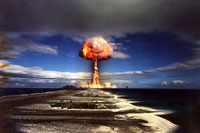India Refuses To Be Discriminated as Nuclear Power
India refused to sign the Nuclear Non-Proliferation Treaty (NPT), the nation’s Minister of State for External Affairs, Shashi Tharoor said. The statement followed the UN Security Council’s approval of the resolution urging all countries to sign the treaty and refuse from their nuclear arms.

The NPT signed in 1970 restricted the number of nuclear superpowers to five countries only – the USA, the USSR, Great Britain, France and China. These were the countries that already had the nuclear weapons at the time when the document was signed.
India was not listed among those states: the nation conducted a first nuclear test in 1974. One hundred and seventy countries of the world agreed to extend the treaty indefinitely without additional conditions in 1995. However, Israel, India, Pakistan and North Korea did not sign the document.
The above-mentioned countries refused to sign it because of their disagreement with the fact that only five large countries of the world used the NPT to monopolize the right for possessing nuclear arms.
Shashi Tharoor has said that India will not adhere to any treaty such as the Nuclear Proliferation Treaty (NPT), and will not sign it as long as it is discriminatory. Another senior Indian official said that India, a nuclear power, would not sign the treaty about the status of a non-nuclear state.
"India cannot accept externally-prescribed norms or standards on matters within the jurisdiction of its Parliament or which are not consistent with its constitutional provisions and procedures, or are contrary to its national interests or infringe on its sovereignty," said the letter from Hardeep Singh Puri, India's permanent representative to the U.N.
India is ready for nuclear disarmament only if other countries do it too.
“The reason why India considers the Nuclear Non-Proliferation Treaty discriminatory lies on the surface. If India signs it, it will lose its nuclear potential, and the nation does not want to do it. This may lead to considerable losses in political, military and ideological aspects,” Vladimir Khrustalev, an expert on nuclear technologies told Pravda.Ru.
“The world cannot do without India now for a number of reasons. The Indian administration can say what it wants having no fears of possible consequences. This may lead to sanctions and isolation for North Korea, but that’s not the case with India. The USA attempted to introduce sanctions against India in 1998 after a series of nuclear tests conducted in the country. However, US officials later acknowledged that it was a mistake. Washington finally lifted all restrictions against India in 2008. The sanctions were not effective at all. India was developed enough not to notice them. Furthermore, the sanctions caused damage to the USA itself,” the expert said.
It is worthy of note that India can not refuse from its nuclear weapons due to political reasons. The nation has very complicated relations with its neighbors – China and Pakistan, which possess nuclear arsenals too.
Sergey Balmasov
Pravda.Ru
Subscribe to Pravda.Ru Telegram channel, Facebook, RSS!


